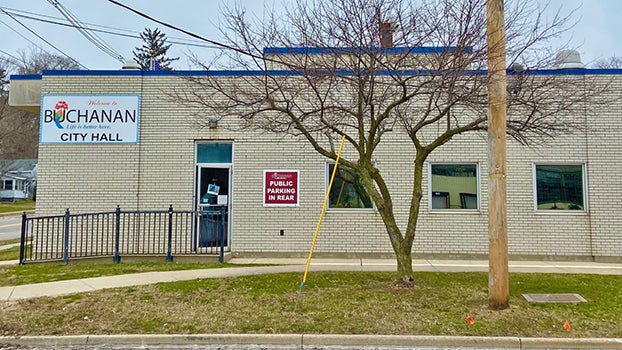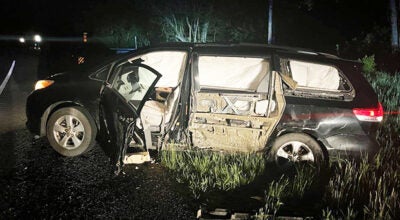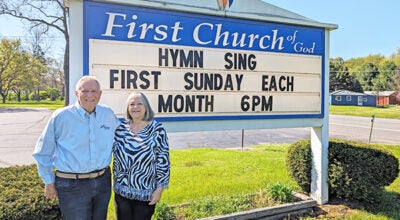Former Dowagiac resident an oil deckhand
Published 9:23 pm Thursday, July 1, 2010

"This is taken in front of naval air station Pensacola's beach to give you an idea how close this stuff is. It all washed right over the red/orange boom," former Dowagiac resident Shannon Pokrandt said Thursday while on storm-related standby. As a deckhand, she works with two "haz whoppers" who shovel up the sludge. Tar balls? "Globs," she calls them. The Navy veteran and former postal employee lived in Dowagiac until she was 16.
By JOHN EBY
Dowagiac Daily News
Former Dowagiac resident Shannon (Higginbotham) Pokrandt has lived in Pensacola, Fla., since the summer of 1997, after she got out of the Navy.
Pokrandt, who attended school with the DUHS Class of 1983, moved to North Carolina at 16 after her sophomore year, but usually makes it to her hometown each summer.
This summer will be no exception.
She and fiance Tony Garritano plan to visit in August.
But right now she’s busy making $200 a day as a deckhand on a 23-foot boat she shares with a captain and two “haz whoppers” trying to skim a thick oil slick washing up on the beaches half a block from her home in the Florida panhandle from crude gushing into the Gulf of Mexico for 74 days.
Pensacola is a city of 300,000. She lives just 10 miles from Alabama.
“I go out there and cry because this is why I moved here,” Shannon said in a phone interview Thursday afternoon while on standby from stormy weather.
“You love where you live and you want to take care of it. The oyster beds are shut down, shrimping, all that great seafood gone. We love seafood and went down to the fisheries (and stocked up her freezer) before it ran out.”
Besides seafood restaurants, there is the tourism toll in general.
A girlfriend who rents for a resort reported 30,000 cancellations into the future.
Shannon points out that even residents of Louisiana and Mississippi come for more “pristine” beaches because Florida has forbidden drilling.
“It’s not good,” she said of the thick toxic tar balls she calls “globs” fouling her environment.
“It’s upsetting, but you’ve got to deal with it. One boat captain from Mississippi shot himself. He might have had problems before, but his wife blamed the stress of this job. I don’t feel any stress, I love myself too much, I just get upset when I see it.”
Shannon, who as a deckhand does “go-for” work, said she lives about four miles from the marina she’s been working out of for the past two weeks.
BP hired a company which in turn hires boats and personnel for the clean-up, including “haz whoppers,” who wear haz-mat suits, two layers of gloves and rubber boots.
“I was specifically hired by my boat captain. I don’t work for anyone else, so I can take pictures and run my mouth. I don’t work for” BP.
The scene Shannon describes sounds like a Wild West gold rush, except these prospectors pans for jobs of indefinite duration to offset their lost livelihoods.
Volunteers cannot touch oil.
She attended a half-day class to be a deckhand.
To be a haz-whopper in a suit, actually picking up oil, requires a three-day class.
The hot suits leave wearers so drenched, Shannon said it is worn for 15 minutes, followed by 45 minutes rest, causing casual observers to think everyone is just sitting around.
In photos she e-mailed, shovels scoop goop like mucking out a barn stall.
She also described equipment thrown in the water and dragged behind the boat that they call a “sausage” as working like a huge tampon to which oil clings.
Captured oil is bagged, duct-taped and bagged again, the placed in designated Dumpsters.
“We don’t know where it goes from there,” she said.
When it “finally hit shore,” the local news was still broadcasting that it was safe to go to the beach.
Shannon retired from the Post Office in January and was working cleaning a bar for a couple of guys who owned three boats idled by the lack of fishing and diving opportunities. “Sure, I’ll get trained,” Shannon said.
Haz whoppers make $37 an hour, overtime after 40 hours. Some log 72-hour weeks, she said.
With a fleet of 5,000 boats in the water, authorities are not letting more get qualified, but there is a need for 10,000 to 15,000, in her estimation.
“The guy I work for had to make up a business license so he could go out there and pick up oil, even though he was Naval man who knew what he was doing,” she said.
“The last few days we’ve had weather issues. We’re trying to outrun water spouts. We’re feeling the effects of Alex even though it’s not coming near. It’s shoving oil back up in here quicker. We’re noticing that. We don’t have to go out farther than a few hundred yards offshore. It’s here now.”
Shannon’s days start at 6 a.m. with a safety meeting and weather briefing, then they report to their assigned boats.
Hers is “task force five” out of 10 based at that marina.
One boat is led by a Special Forces retiree, accompanied by two Coast Guard representatives who oversee and point them to oil.
“They can fire you for anything,” she said, which keeps everyone on their toes. “If you’re fired, you’re going to be hurt, then they’re going to be hurt because they lost you.”
“Then we take off,” Shannon said.
“Me, I help guys suit up. Duct tape their suits on. This stuff is so thick, it’s in the air. It smells horrible, like oil in the air. Half a block from water, I can’t smell it at the house, but I can feel it on my skin. You know it’s there.”
She hasn’t had pimples since her teen years, but her skin is starting to break out.
Dawn dish scoop “sells by the gallon” because it helps remove oil.
“I’ve only seen two birds physically covered with oil. We’re not allowed to touch them,” Shannon said, which could subject her to a $150,000 fine.
Even flicking a cigarette butt in the ocean is punishable by $5,000, which she finds ironic given the elephant in the ocean of a vast oil spill engulfing the fragile ecosystem.
Of being a deckhand for two weeks, Shannon said, “If you go one day, you get the feel.
The second day, you’re considered an expert. By the third day, you’re training new guys” because of a high turnover rate.
There was the group of guys from Louisiana who had never been on a boat and suffered from seasickness.
Another group from Mobile was mostly fired.
But lately they’re “staying longer than a few days,” she said. “They need jobs. Shrimpers and commercial fishermen, they’ve got to make money. Maybe we could keep up with it with 10,000 more boats, but we’re not going to make a dent in it” until BP succeeds at capping the now-familiar gushing plume.
They’re usually in the ocean by 7:30 a.m. and return to dock by 3 p.m. One day they toiled until 6.
Shannon described three big barges, called “decon(tamination) stations.”
Before pulling into the marina, their boat must be pressure washed because gunk cakes on the sides, in an attempt to maintain “clean zones” free of dirty stuff.
The marina is supposedly a clean zone, but it’s getting harder to tell the difference.
When weather closed the decon station, oil entered the marina.
Shannon is more experienced coping with hurricanes.
In September 2004, a year before Katrina blasted New Orleans, “My house got taken out by Hurricane Ivan,” she said. “My son said, “God makes hurricanes to bring people together.”






